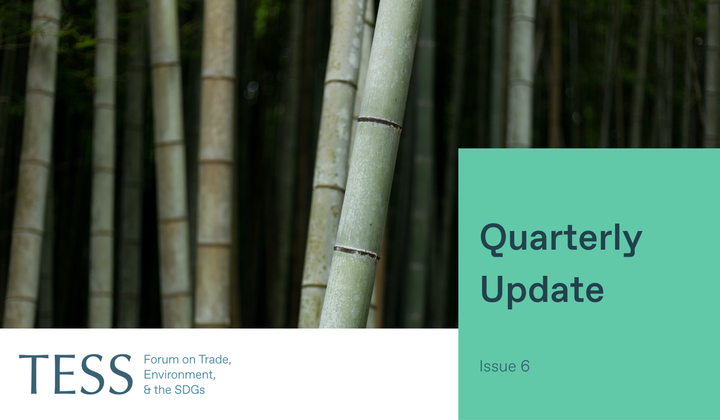Welcome to the ninth edition of the TESS Quarterly Update. In this edition, we start with a brief round-up of a selection of major international gatherings of direct relevance to our work, followed by updates on the activities and impacts that TESS has pursued this past quarter to foster international cooperation and action on trade and sustainability. Look out for our newly released Annual Report 2023 and our ongoing Synergies series of expert views on reviving multilateralism. In the past quarter, we proudly celebrated our three-year anniversary!

Photo © WTO – Irish Industrial Development by Seán Keating
A key expectation of a growing diversity of governments and a broad range of stakeholders is for the World Trade Organization (WTO) to respond more explicitly and proactively to global environmental challenges and wider sustainable development priorities. In this regard, there is a growing range of venues at the WTO where members can exchange perspectives on challenges and opportunities, identify pathways for cooperation, and forge concrete outcomes. In the wake of the Thirteenth WTO Ministerial Conference (MC13), which took place from 26 February–2 March 2024 in Abu Dhabi, where the vast majority of WTO members affirmed they are ready to engage in building cooperation on sustainability and trade, the past quarter saw positive steps in this direction.
On the occasion of Environment Day on 5 June, the WTO Secretariat organized an event titled Supporting the Transition to Clean Energy at which opportunities in the clean energy sector for developing and least developed countries were discussed. The event also provided a preview of a WTO publication launched at the Global Review of Aid for Trade 2024 on how aid for trade can help unlock these opportunities. The 9th Global Review of Aid for Trade, held at the WTO on 26–28 June, offered opportunities to explore how aid for trade and financing can support trade-related contributions and responses to the sustainable development priorities of developing countries, including in relation to environmental challenges and the climate crisis. On 27 June, the global review was also the opportunity for the International Trade Centre (ITC) to celebrate its 60th anniversary.
On 23 April, the Committee on Trade and Environment (CTE) held a second thematic session on Trade Contributions to Energy Transition Efforts Concerning Climate Adaptation and Mitigation, building on a first session organized in November 2023. The first panel considered the potential trade impacts of the clean energy transition, while the second focused on fostering a better understanding of trade-related climate measures. A regular meeting of the CTE then took place on 24–25 April and on 19–20 June, where, among other issues, members resumed ongoing discussions on reinvigorating the committee and agreed to focus upcoming thematic sessions on trade-related climate measures, technology transfer, and sustainable agriculture. At the meeting, the new committee chair Ambassador Erwin Bollinger of Switzerland also announced that this year's Trade and Environment Week will take place on 7–11 October.
During the quarter, the three member-led initiatives on environmental sustainability, plastic pollution, and fossil fuel subsidy reform continued their work.
On 15–16 April, the co-sponsors of the Trade and Environmental Sustainability Structured Discussions (TESSD) held their first working group meetings since MC13, where co-convenors had issued a statement, an updated work plan, and a series of outcome documents summarizing the work of its four working groups. At the April meeting and a subsequent meeting on 17–18 June, the four working groups featured substantive presentations on a wide range of issues and members discussed the way forward and implementation of the updated work plan. On 12 April, at a Pre-Plenary meeting, members of the Dialogue on Plastics Pollution (DPP) discussed the work plan for implementing the ministerial statement circulated at MC13. This was followed by another Pre-Plenary meeting on 13 June at which the initiative’s coordinators presented the proposed focus areas for the three workstreams of the 2024 work plan. On 28 May, the Fossil Fuel Subsidy Reform (FFSR) initiative held its first meeting since MC13, where co-sponsors had issued an updated ministerial statement and a set of options to advance reform. At the May meeting, members discussed how to make progress on concrete action steps under each of the three pillars of the initiative’s work plan.
Finally, on 2–3 July, the WTO Secretariat convened a workshop on examining contemporary challenges in the agriculture sector in the context of WTO negotiations. The goal of the two-day workshop was to provide a forum for external experts and WTO members “to consider the underlying causes of the stalemate in the agriculture negotiations and think strategically about possible changes of perspectives or processes that could result in an efficient and results-oriented process at the WTO.”
In other WTO news, at a meeting with the Azerbaijani President, DG Okonjo-Iweala welcomed Azerbaijan's decision as host of the 2024 UN Climate Change Conference (COP29), which will be held in Baku in November, to include a Trade and Investment Day and a Trade House/Pavilion.
Looking ahead, the WTO’s Public Forum 2024 will take place in Geneva from 10–13 September. Stay tuned as TESS will be on the ground working to support inclusive international cooperation and action on trade and sustainability!

Photo © Ben Wong Production 2021 – #TurnOffThePlasticTap
From 23–29 April 2024, the fourth session of the Intergovernmental Negotiating Committee to Develop an International Legally Binding Instrument on Plastic Pollution, including in the Marine Environment (INC-4) convened in Ottawa, Canada. At this penultimate of five scheduled sessions to complete the negotiations before the end of 2024, as per the mandate of UNEA Resolution 5/14, delegates discussed a revised draft text of the future instrument compiled after their deliberations at INC-3.
While some areas of convergence emerged, alongside continued divergences on a number of key issues, progress was made in that all sections of the revised draft text underwent a process of technical streamlining, while some sections saw delegates engage in line-by-line negotiations. INC members reinstated their commitment to reach an agreement by the end of the year.
Delegates agreed to establish intersessional work on two tracks: first on “potential sources, and means that could be mobilized, for implementation of the objectives of the instrument, including options for the establishment of a financial mechanism, alignment of financial flows, and catalyzing finance” and second to “identify and analyze criteria and non criteria based approaches with regard to plastic products and chemicals of concern in plastic products, and product design focusing on recyclability and reusability of plastic products, considering their uses and applications.”
INC-5 is scheduled to take place from 25 November to 1 December 2024 in Busan, Republic of Korea.
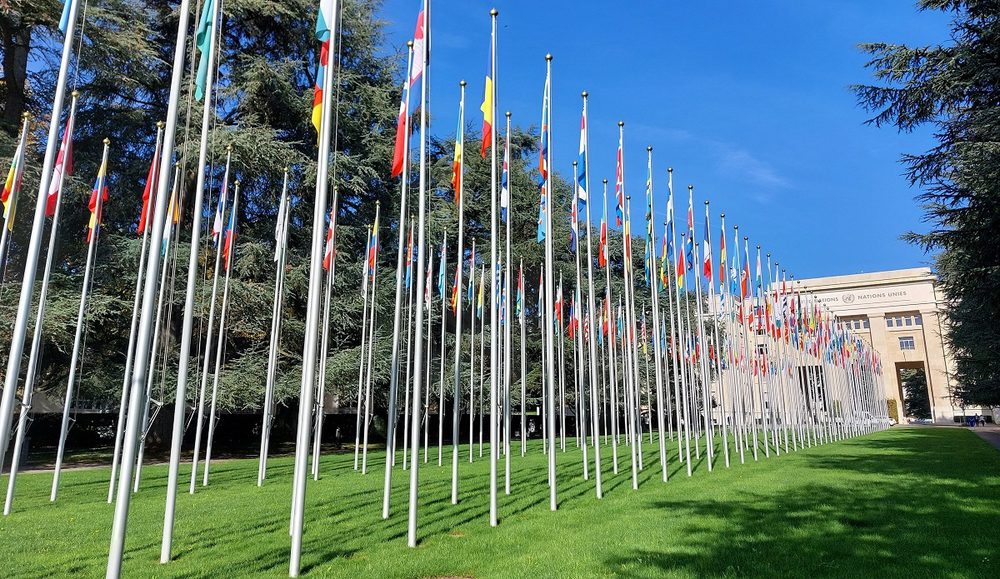
Photo by Mmoka on Unsplash
In UN news, UN Trade and Development (UNCTAD) commemorated its 60th anniversary during the quarter. To mark the occasion, the UN Secretary-General, heads of state, ministers, government officials, experts, and leading economists convened at a Global Leaders Forum at the Palais des Nations in Geneva on 12–14 June. Under the theme Charting a New Development Course in a Changing World, the forum’s agenda explored new strategies for development and focused on the integrated treatment of trade and development, and the interrelated issues of finance, technology, investment, and sustainable development.
You can view videos of the sessions on UN TV and listen to an edition of The Weekly Tradecast where UN Trade and Development Secretary-General Rebeca Grynspan discusses UNCTAD at 60 and charting a new course for development.
From 3–13 June, the June UN Climate Meetings (SB60) were held in Bonn, Germany. After a two-week round of intense negotiations at the 60th biannual sessions of the UN Framework Convention on Climate Change (UNFCCC) subsidiary bodies, climate negotiators left many issues unresolved ahead of COP29, scheduled to take place from 11–22 November 2024 in Baku, Azerbaijan.
Climate finance was on top of the agenda in Bonn, as parties are expected to agree on a new collective quantified goal by the end of COP29. After four sessions of the ad-hoc working group, negotiators left Bonn with a 35-page input paper summarizing proposals on financing but falling far short of being a negotiating text.
The issue of finance also cast its shadows over talks in Bonn on modalities of the two-year UAE-Bélem work programme launched to develop indicators for measuring progress towards the 11 targets of the UAE framework for global climate resilience and other elements under the global goal on adaptation. Eventually, a draft conclusions document was achieved. Delegates also made modest progress on technical aspects of Article 6, particularly under articles 6.2 and 6.4 covering carbon markets, but have left substantive issues to COP29. Parties were unable to reach draft conclusions to advance for COP29 on the mitigation ambition and implementation work programme and only draft procedural conclusions were issued for the work programme on just transition pathways.
On 22–23 September 2024, attention will turn to the Summit of the Future, convened under the auspices of the UN General Assembly, which will host hundreds of world leaders, policymakers, experts, and advocates in New York in an effort to revitalize multilateralism and reset global cooperation. The revised draft (Rev.1) of the Pact for the Future was released on 14 May. The revised draft will serve as the foundation of a third reading for intergovernmental deliberations during which member states are expected to negotiate and endorse a wide-ranging and action-oriented Pact for the Future in the lead-up to and during the summit.
With the chapeau set to be negotiated at a later stage, the revised draft (Rev.1) comprises 52 actions grouped under five chapters. Under Chapter 1, Sustainable Development and Financing for Development, Action 3 in the draft focuses on ensuring the "global trading system is an engine for sustainable development” and includes draft language on how this goal can be achieved. According to the roadmap put forward by Germany and Namibia, the co-facilitators of the Summit of the Future, Rev.2 of the draft is planned for release in early July.
What We've Focused On
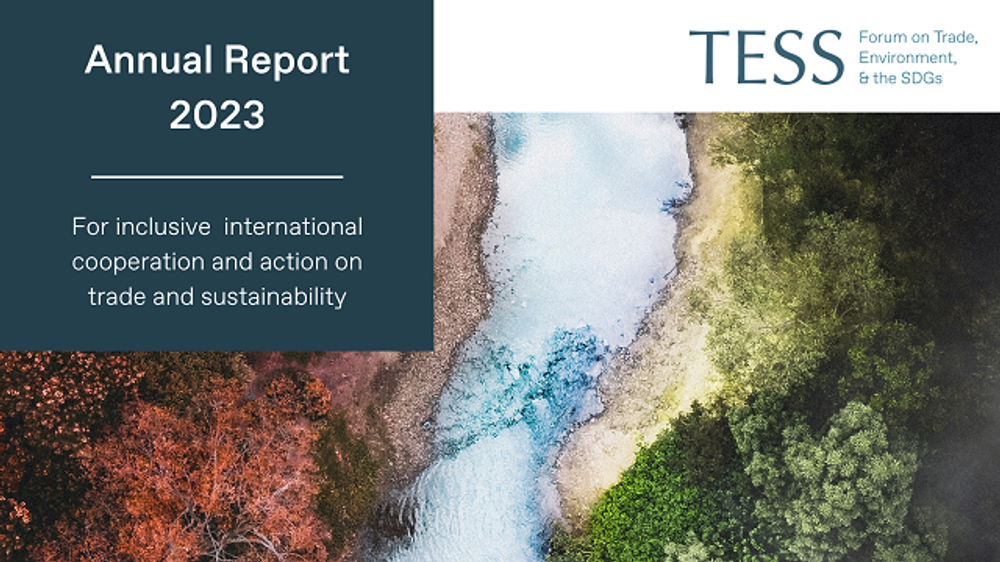
Our Three-Year Anniversary
In June, TESS released our Annual Report 2023 where we review our work and main achievements and impact in 2023. The report was released as TESS proudly celebrates its three-year anniversary. Officially launched in June 2021 to foster inclusive international cooperation and action on trade, environment, and sustainable development, TESS has since grown and developed tremendously as an organization. We thank our many partners and supporters whose collaboration has been vital to enable us to deliver on our mission. We look forward to continuing this journey with you!
Cutting across all of our thematic work, a further key initiative over the past quarter was the launch of our series of Ambassadors’ Roundtables on Trade and Sustainability. The first in the series, which we hosted on 18 April, was an opportunity for ambassadors to share views on priorities on trade and sustainability in the multilateral setting over the coming year, including on themes for future roundtables. At the second roundtable, organized on 7 June in the lead-up to the 9th Global Review of Aid for Trade, ambassadors were invited to reflect and share views on priorities and opportunities related to aid for trade and financing for sustainability in trade.

Climate Crisis
In June, we launched a new project on Supporting Development of National Strategies and Priorities at the Nexus of Trade, Climate Change, and Sustainable Development. This project aims to support developing country governments and their stakeholders to formulate national visions, strategies, and policy options on trade that reflect national climate and sustainable development priorities and challenges and engage in relevant processes at the international level. Phase 1 of the project will focus on several countries in Southeast Asia and the Pacific Region, working in partnership with governments and local expert institutions.
In April, we published a policy paper on Fossil Fuel Subsidy Reform: Options for Inclusive Collective Action at the World Trade Organization. Some of the key findings of the paper, including on categories of fossil fuel subsidies that should be prioritized for reform, were presented on 28 May at a meeting of the WTO Fossil Fuel Subsidy Reform initiative.
On 6 May, in partnership with the Leadership Group on Industry Transition (LeadIT), a public-private initiative co-chaired by the governments of India and Sweden, we convened a roundtable on Technology Co-Development and Trade for Just Industry Transitions to Net Zero for Heavy Industry. Key takeaways from the meeting are available in this summary. In other news, on 5 June, the TESS Executive Director participated in a high-level event organized by the Climate Overshoot Commission on Trade to Reduce the Risks of Climate Overshoot. A brief summary of the meeting is also available.
On 26 June, at the 9th Global Review of Aid for Trade, TESS co-organized with UN Trade and Development and the WTO Secretariat a session on Nationally Determined Contributions 3.0, Trade, Finance, and Investment and the Role of International cooperation and Aid for Trade. Participants explored the capacity gaps to be addressed for developing economies to reflect trade, finance, and investment considerations, priorities, and policies in their climate strategies and policy frameworks.
TESS organized two further roundtables under our Climate Crisis thematic work during the quarter. The first, on 7 May, focused on Green Subsidies, Trade, and Sustainable Development: Priorities for Enhanced International Cooperation on Financing Sustainability, reflecting on recent policy developments and identifying key challenges and priorities for international cooperation on financing sustainability. The second, on 25 June, focused on Trade, Climate Adaptation, and Climate-Resilient Development, which reviewed key trends and policy developments as well as challenges and opportunities for trade-related cooperation around climate adaptation and climate-resilient development.
In our role as Secretariat of the Coalition of Trade Ministers on Climate, we continued to support the work of the co-leads to advance cooperation on the coalition’s Menu of Voluntary Actions and prepare the coalition’s presence at COP29, which will feature a Trade and Investment Day and a Trade House/Pavilion.
View our thematic work on the climate crisis.

Plastic Pollution
As governments and stakeholders gathered in Ottawa from 23–29 April 2024 for the fourth session of negotiations on a global plastics treaty (INC-4), TESS worked to support an ambitious and effective treaty, while sustaining our ongoing efforts to foster trade-related cooperation on plastic pollution.
Alongside INC-4, we hosted a public event on 26 April to highlight opportunities for cooperation on trade and plastic pollution, sharing insights from the work of the DPP, including recent developments such as the ministerial statement of the DPP issued at MC13, lessons about the compatibility of multilateral environment agreements (MEAs) and WTO rules, and national experiences that can inform and support the work of the INC. In addition, on 21–23 April and ahead of the opening session of INC-4, we hosted three informal roundtables on several key topics for the plastics treaty negotiations: primary plastic polymers; chemicals and polymers of concern; and financing and means of implementation. We also spoke at an official INC-4 side event facilitated by OECD and BRS on 24 April on approaches to capacity-building, financing, and financial mechanisms.
In the lead up to and following INC-4, we continued to support the work of the High Ambition Coalition to End Plastic Pollution (HAC) as part of its Secretariat function. You can read the HAC Member States Ministerial Joint Statement for INC-4.
During the quarter, we also continued active engagement with the work of the DPP. Among other activities, on 13 June we contributed to the DPP Pre-Plenary meeting where we provided comments on proposed areas of focus in the three workstreams of the 2024 work plan. Then, on 28 June, at the WTO’s aid for trade global review, we co-organized with the DPP a session on What Do Developing and LDC Members Need to Implement Trade-Related Policies to Tackle Plastic Pollution? The session reviewed the efforts of the DPP to identify and spur cooperation on the trade-related capacity building and technical assistance needs of developing and least developed members, including the results a factual report on a survey of developing country DPP members on their aid for trade needs in regard to tackling plastic pollution.
Lastly, as the international health community gathered in Geneva for the 77th World Health Assembly, on 28 May, we co-hosted a roundtable on The Plastics Crisis as a Health Crisis: How Can the International Health Community Support the Global Response to Plastic Pollution and the Plastics Treaty? The event aimed to foster a dialogue on how the global plastics treaty currently under negotiation can address human health protection in ways that are environmentally sound while pursuing the highest attainable standard of health in the context of sustainable development priorities. A short summary of the event is available.
View our thematic work on plastic pollution.

Biodiversity and Sustainability in Agriculture, Food Systems, and Use of Natural Resources
As part of our ongoing work on a trading system that supports sustainability in the agricultural sector, on 8 May, we convened a meeting of the Expert Group on Environmentally Harmful Agricultural Subsidies, mobilized by TESS to identify a set of environmentally harmful subsidies for priority action at the international level and inform discussion on options for cooperative action in the multilateral trading system. A final report synthesizing the group discussions will be published in September 2024 to provide guidance to policymakers. On the same topic, on 21 June, we co-hosted with UNEP a one day deep-dive on Fostering International Trade Cooperation on Environmentally Harmful Agricultural Subsidies. The deep dive, which brought together government officials from both developed and developing countries with leading experts from think tanks and international organizations active in our expert group, reviewed possible trade-related approaches and pathways to address environmentally harmful agricultural subsidies, and was an opportunity for the work of our expert group to be informed directly by the perspectives of government officials. Participants benefited from opening remarks from the WTO ambassadors of Australia, Brazil, and Thailand.
In other agriculture-related activities, on 3 July, TESS Head of Policy Analysis and Strategy, Christophe Bellmann, was invited to moderate a session at a two-day workshop convened by the WTO Secretariat on examining contemporary challenges in the agriculture sector in the context of WTO negotiations. Among other issues, the session explored new avenues for possible trade-offs and whether the structure and underlying concepts of the Agreement on Agriculture are still fit for purpose.
As part of our work on nature-positive trade, on 18 April, we co-hosted with NatureFinance and UNEP an expert roundtable on Nature-Positive Trade Rules for Sustainable Development. At the event, participants from the nature, trade, finance, and sustainable development communities explored the role of trade and trade rules in addressing the biodiversity crisis and supporting a global bioeconomy that serves sustainable development. With the goal of fostering a more systemic and long-term vision for a nature-positive trading system, the discussion reviewed options, principles, and approaches for enhanced cooperation on trade policies and rules to respond to nature risks and incentivize sustainable and nature-positive trade.
Finally, on 22 May, for Biodiversity Day Celebration 2024, Carolyn Deere Birkbeck moderated a high-level event bringing together the senior leadership of a broad range of international and stakeholder organizations within and beyond International Geneva, highlighting the significance of the Kunming-Montreal Global Biodiversity Framework, the urgency of action, and International Geneva’s role in supporting its implementation.
View our thematic work on the natural environment.

Circular Economy
During the quarter, we finalized the report of the Expert Group on Trade, Circular Economy, and Sustainable Development, mobilized by TESS to develop guidance on best practices and approaches to the trade dimensions of circular economy policies and measures, with the overarching goal of advancing sustainable development goals. The report aims to provide guidance to policymakers and stakeholders and contribute to ongoing deliberations on these topics at the WTO in the context of the Committee on Trade and Environment and the TESSD and DPP initiatives, as well as in other international organizations and processes. The report will be released in September.
In other circular economy news, on 3 June, we co-hosted with UNEP a roundtable on Trade, Sustainability, and Circularity in the Textiles Sector: Perspectives on Trade in Second Hand Textiles. The event brought together delegates from different regions and countries at different development levels with a number of experts to share perspectives on trends, issues, and challenges related to trade in second-hand textiles as well as priorities for international cooperation. The event followed a previous roundtable organized by TESS in collaboration with UNEP in March 2023 on Trade, the Circular Economy, and Sustainable Development in the Textiles and Clothing Sector.
View our thematic work on circular economy.
Synergies
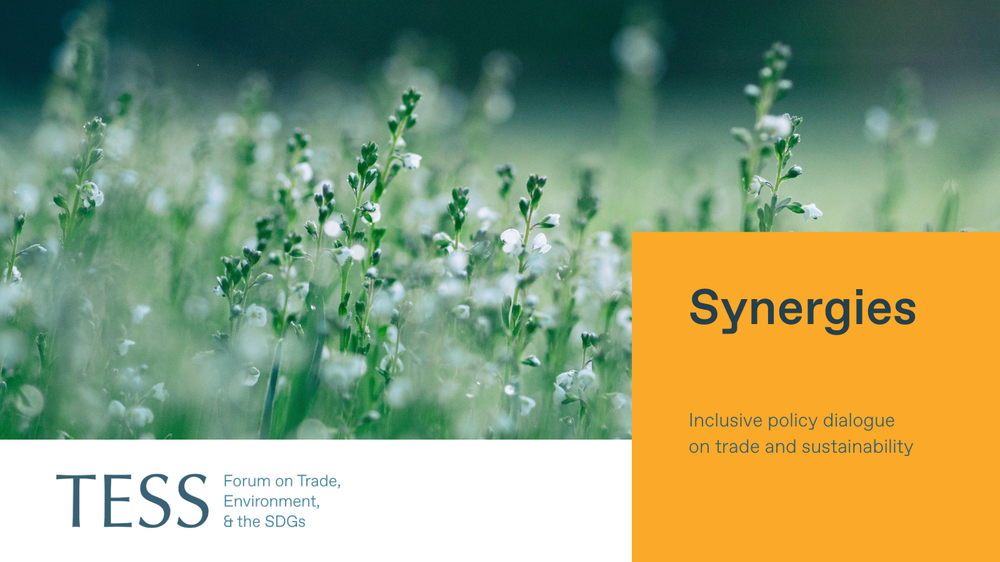
We invite you to read articles published over the past quarter in Synergies, the TESS blog dedicated to promoting inclusive policy dialogue at the intersection of trade, environment, and sustainable development, drawing on perspectives from a range of experts from around the world.
How Can Aid for Trade and Financing Help Support the Trade-Related Priorities of Developing Countries to Tackle Plastic Pollution? by Mahesh Sugathan (05 July)
We Need Serious Conversations on Finance at the Intersection of Trade, Climate, and Sustainable Development by Hon. Kerrie D. Symmonds (28 June)
Unlocking the Potential of International Trade to Promote a Global Secondary Market and the Transition to a Circular Economy: What Role for the WTO? by Antoine Oger & Pierre Leturcq (28 June)
Promoting Sustainability Through Reforming Subsidies for Agriculture in the WTO by Christophe Bellmann, Clara Brandi, Umberto Celli Junior, Carolyn Deere Birkbeck, & Peter Draper (13 June)
The IMO Carbon Pricing Mechanism, the Equitable Transition of International Shipping, and WTO Law by Goran Dominioni (30 May)
Practical First Steps Towards Comprehensive Subsidy Reform by Ken Ash, Anthony Cox, & Peter Draper (29 May)
The WTO Can Help Reform Subsidies to Fossil Fuels That Propel the Climate Crisis by Peter Wooders (22 May)
Reshaping WTO Subsidy Rules for a Sustainable Future by Daniel C. Esty & Elena Cima (08 April)
Since March 2024, Synergies has commissioned and published expert views for a unique series titled Reviving Multilateralism: From Vision to Action on Trade and Sustainability at the WTO.
Our Quarterly Graph
Expected Benefits and Adverse Impacts of Fossil Fuel Subsidies and Approximate Share of Global Fossil Fuel Subsidies
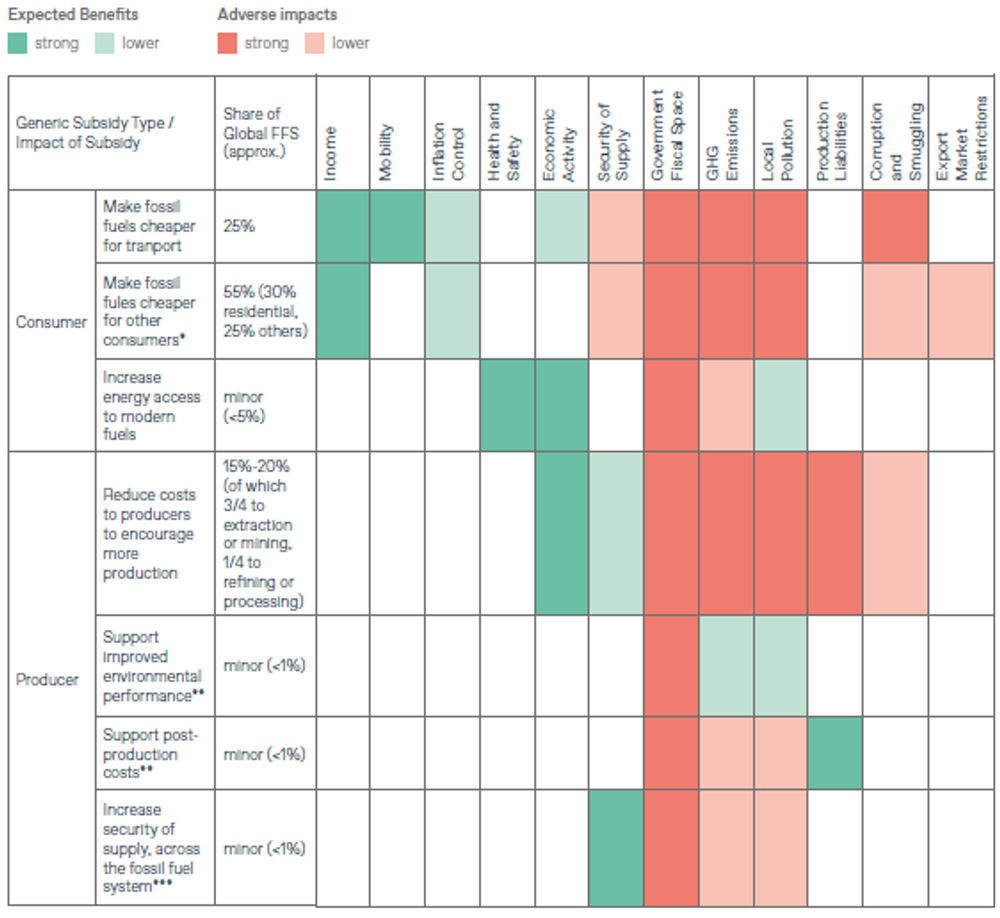
Our quarterly graph is taken from our policy paper published in April and authored by Peter Wooders on Fossil Fuel Subsidy Reform: Options for Inclusive Collective Action at the World Trade Organization. To inform discussion of options for reform of fossil fuel subsides, the graph estimates the global share of fossil fuel subsidies by subsidy type. It also presents the key expected benefits and adverse impacts per unit of subsidy, highlighting that all fossil fuel subsidies involve trade-offs between expected benefits and adverse impacts, with adverse impacts in all cases, including the reduction of government fiscal space.




